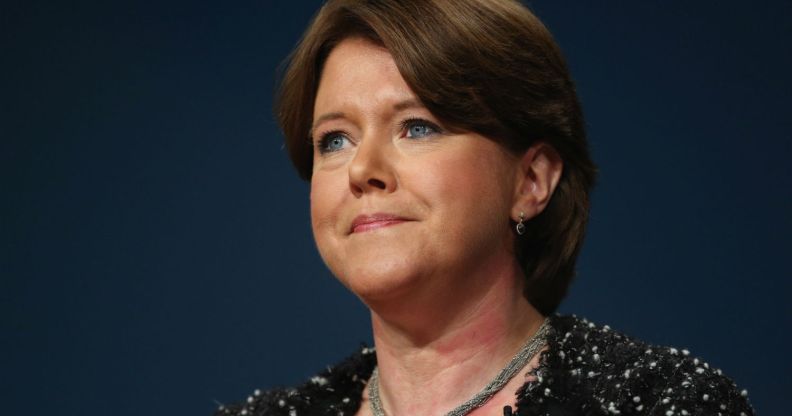NHS ‘breaking the law’ with poor trans services, landmark report warns

(Getty)
A report from the Women and Equality Select Committee has called for radical reforms to the UK’s gender laws – and strongly rebukes the government for failing to make progress.
The Parliamentary committee, chaired by Conservative former equalities minister Maria Miller, has oversight across all government departments on equalities issues.
After an inquiry on trans issues lasting several months, a report released today calls for drastic changes across a number of departments – from the healthcare system to gender laws to prison reforms.
In an exclusive interview with PinkNews, Mrs Miller said that transgender people were being “failed” by the law, health services and other public bodies – while the report itself directly accuses the NHS of breaking “legal obligations” to trans patients.
One of the most significant changes recommended is a revamp of gender recognition laws, to remove bureaucratic hurdles preventing trans people being recognised as the correct gender. The Committee noted Ireland’s self-declaration system – where changing gender is as simple as renewing a passport.
The report says: “Within the current Parliament, the Government must bring forward proposals to update the Gender Recognition Act, in line with the principles of gender self-declaration that have been developed in other jurisdictions.
“In place of the present medicalised, quasi-judicial application process, an administrative process must be developed, centred on the wishes of the individual applicant, rather than on intensive analysis by doctors and lawyers.”
The report also recommends that the Gender Recognition process is opened up to trans people aged 16 and 17, on the basis of self-declaration.
Elsewhere, the report advocates a switch towards recognising people who don’t identify as male or female.
It says: “The UK must follow Australia’s lead in introducing an option to record gender as ‘X’ on a passport. If Australia is able to implement such a policy there is no reason why the UK cannot do the same.”
Among other changes suggested are for trans issues to be taught in schools “as part of Personal, Social and Health Education”.
The report is most directly critical of “serious deficiencies” within the NHS on gender issues, where backlogs have led to waits of several years for gender surgery.
The committee found that the current system is in breach of the law, adding it is “in clear breach of the legal obligation under the NHS Constitution to provide treatment within 18 weeks”
Slamming the situation as “completely unacceptable”, the report raises concerns about “the apparent lack of any concrete plans to address the lack of specialist clinicians”.
It adds: “This will be a serious obstacle to addressing the lack of capacity, which growing demand for the service is sure to exacerbate, and cannot be ignored.”
However, some of the recommendations of the report may prove controversial. For instance, it recommends an end to the Equality Act exemption for single-sex services such as women’s refuges – who are currently able to turn away trans women even if they have Gender Recognition Certificates.
Under the report’s suggestions, this would no longer be allowed – which is likely to prove divisive among feminist and women’s rights groups.
Responding to the report, Minister for Women and Equalities Nicky Morgan said: “I would like to welcome this report, and thank Maria and her Committee for all their valuable work. The fact the Women and Equalities Select Committee chose transgender equality as the subject of their first inquiry sends a clear signal that this is an important issue and that we are committed to supporting transgender people.
“As recently as last year, transgender issues were something rarely spoken about in mainstream media. Yet transgender equality is now a regular topic of public debate, more people are talking about their experiences and we have seen transgender storylines covered everywhere from the big screen to some of the nation’s best loved TV programmes.
“We must however recognise that many transgender people still face terrible discrimination in their daily lives, which is why I made securing further progress on transgender equality a priority for the Government Equalities Office. I remain determined to tackle discrimination against transgender people wherever it exists so that all members of our society can live their lives free from persecution, and able to fulfil their potential.
“We have made great strides in recent years and the UK was – for the fifth year in a row – recognised as the leading country in Europe for LGB&T equality. In 2011 we published action plans setting out how the government would tackle LGB&T discrimination of which the vast majority of commitments have been delivered.
“As part of this work we recently published guidance for employers and service providers to help improve knowledge and understanding of transgender issues, and we have also established a £2 million fund to tackle homophobic, biphobic and transphobic bullying in our schools –and I have seen first-hand the positive impact this is already having.
“But we are not complacent. As the Committee has recognised, transgender people often face huge challenges, from appalling harassment and abuse to obstacles in accessing public services.
“On a recent visit to Scotland I met with the organisation Beyond Gender who spoke to me about the problems they faced and the bullying they have endured. We will now review the Committee’s report, and work with other government departments to look at the recommendations.”

